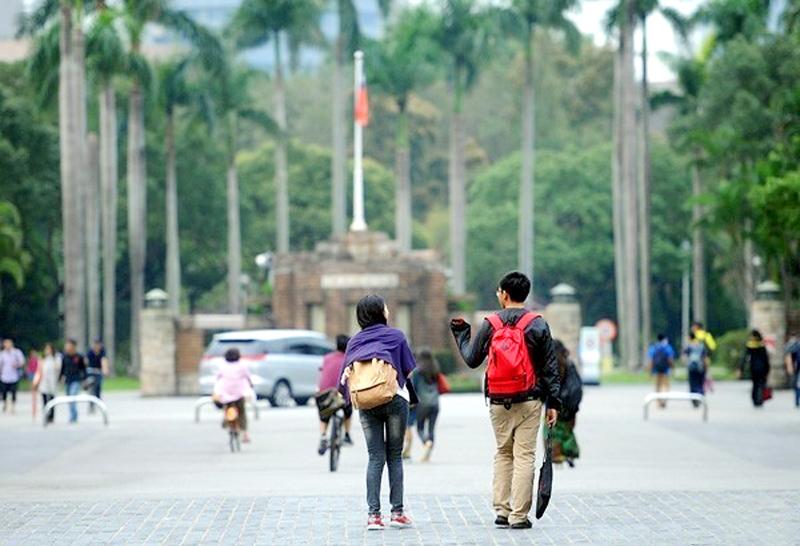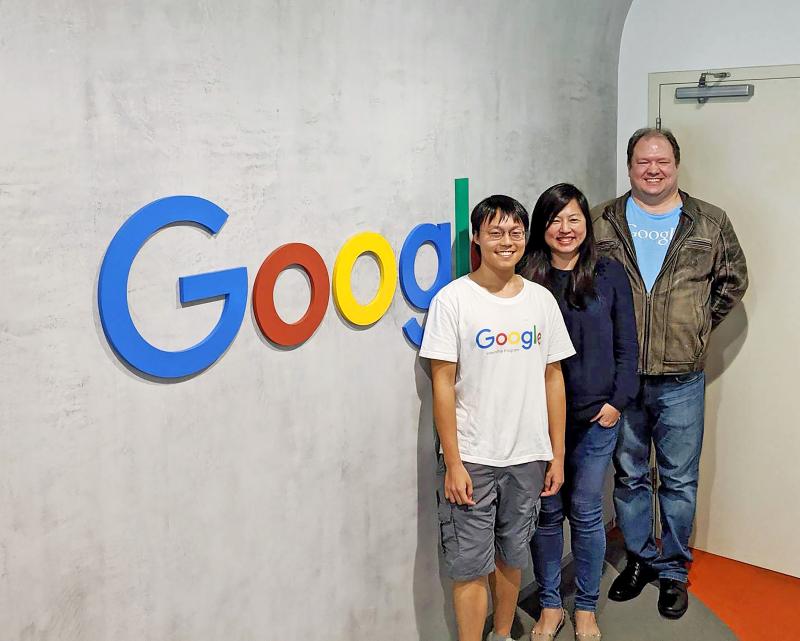Brian Chiu (丘博元) echoes many university students when he says he’s frustrated by the lack of internships available.
“After sending out dozens of applications, only one company got back to me,” says the National Chiao-Tung University student. And that internship didn’t pan out.
Yvonne walked into a position at a tech company because of her father’s connections.

Photo: Taipei Times
As with students like her — with family connections — resumes are directly forwarded to human resources departments.
While informational interviews were set up for Yvonne, who didn’t want her full name revealed because it might compromise her father, she says that such a process is “just a formality.” Placements are almost always guaranteed with such referrals.
Another problem for these interns is that many of the positions are unpaid, leading to concerns that they are exploitative.

Photo courtesy of Google
Kiefer Huang (黃子羽) says it makes sense if companies with structured internship programs don’t pay their interns. Huang, who received an unpaid position at a multinational company over the summer, cited the resources needed to train interns as a hidden cost on the company’s side. Even though he did not get paid, he feels his internship experience was “worth it.”
But not everyone is privileged enough to work for free. Students like Chang Hsin-wen (張馨雯), for example, took a full-time unpaid internship while continuing to work part time. But she still felt the experience was worthwhile.
You first have to get your foot in the door, though.
For college students like Chiu internships can fundamentally shape the trajectory of their career paths. However, most universities provide inadequate resources to help students land such opportunities. And, as the example of Yvonne shows, competition for internships is hardly a level playing field. Oftentimes, such opportunities are exclusive to those who know the right person and those who need not worry about paying bills. Amid an economy weakened by the pandemic, students had to reckon with drastically different realities.
The Taipei Times interviewed 17 college students who attempted to seek internship opportunities this summer. Seven of them managed to secure an internship, while others were left without an offer by the start of their summer breaks.
Among the seven interviewees who interned this summer, all but one obtained their opportunities through family connections.
PRESSURE
When asked about their motivation to pursue internships, many cited their degree requirements. However, most found their school’s career center to be of little use.
“While many schools do provide pipelines to intern at certain companies, those opportunities are not particularly appealing to the students. There’s a mismatch between what students are interested in pursuing and what their schools offer,” says Claire Ke (柯友涵), a Radio & Television student at National Taiwan University of Arts who applied for three internships.
Ke received one offer, but had to decline it because it was for an entire year and could only devote time to a summer internship.
Instead, it is far more common for students to be left navigating the corporate world on their own, scavenging for the scarce openings scattered across job banks like 104 and 1111, Web sites like Blink and CakeResume and numerous private Facebook groups.
Peer pressure is also cited as a deciding factor: fear of lagging behind when students see that their peers have begun looking for internships.
The past decade has seen the emergence of the trend for college students to start looking for internship opportunities early, which can be as early as the summer before freshman year, as one of our interviewees reported. Internships have now become the new entry-level jobs. Compared to previous generations, the timeline for entering the job market has been significantly accelerated.
TRIVIAL TASKS
With very few internship opportunities openly advertised, competition for internships is fierce. It is not uncommon for acceptance rates to hover around single digits. This is consistent with the figures released last year by Line, with an acceptance rate of 0.3 percent, and Acer, one percent.
Yet even when students like Yvonne manage to secure internships, these opportunities do not necessarily guarantee an enriching experience. When the kids of the management’s friends come into the office, the managers often struggle to find jobs for them to do.
“I was often given trivial tasks or left with nothing to do,” Yvonne says. She added that even after asking for more work, she was ignored.
Yvonne’s experience reflects the peculiarity of internships in Taiwan. Not established to benefit the companies who take on interns, many opportunities are created in an ad-hoc fashion as a service to personal connections. These doors are never open to those without connections to the management. And even for those who are fortunate enough to get their foot in the door, oftentimes, such programs are not designed for personal growth.
Altogether, these practices continue to perpetuate the vicious cycle of the overemphasis on connections over merit.
Johnson Chou (周昱程), a Taiwanese student studying in China who applied for nine internships through 104, didn’t hear back from any of them.
“Climbing the corporate ladder is like scaling a mountain. You don’t get anywhere without putting in the effort,” he says. “However, without the right equipment, you are not even going to find the trailhead,” Chou said.

Last week the story of the giant illegal crater dug in Kaohsiung’s Meinong District (美濃) emerged into the public consciousness. The site was used for sand and gravel extraction, and then filled with construction waste. Locals referred to it sardonically as the “Meinong Grand Canyon,” according to media reports, because it was 2 hectares in length and 10 meters deep. The land involved included both state-owned and local farm land. Local media said that the site had generated NT$300 million in profits, against fines of a few million and the loss of some excavators. OFFICIAL CORRUPTION? The site had been seized

Next week, candidates will officially register to run for chair of the Chinese Nationalist Party (KMT). By the end of Friday, we will know who has registered for the Oct. 18 election. The number of declared candidates has been fluctuating daily. Some candidates registering may be disqualified, so the final list may be in flux for weeks. The list of likely candidates ranges from deep blue to deeper blue to deepest blue, bordering on red (pro-Chinese Communist Party, CCP). Unless current Chairman Eric Chu (朱立倫) can be convinced to run for re-election, the party looks likely to shift towards more hardline

Sept. 15 to Sept. 21 A Bhutanese princess caught at Taoyuan Airport with 22 rhino horns — worth about NT$31 million today — might have been just another curious front-page story. But the Sept. 17, 1993 incident came at a sensitive moment. Taiwan, dubbed “Die-wan” by the British conservationist group Environmental Investigation Agency (EIA), was under international fire for being a major hub for rhino horn. Just 10 days earlier, US secretary of the interior Bruce Babbitt had recommended sanctions against Taiwan for its “failure to end its participation in rhinoceros horn trade.” Even though Taiwan had restricted imports since 1985 and enacted

Enter the Dragon 13 will bring Taiwan’s first taste of Dirty Boxing Sunday at Taipei Gymnasium, one highlight of a mixed-rules card blending new formats with traditional MMA. The undercard starts at 10:30am, with the main card beginning at 4pm. Tickets are NT$1,200. Dirty Boxing is a US-born ruleset popularized by fighters Mike Perry and Jon Jones as an alternative to boxing. The format has gained traction overseas, with its inaugural championship streamed free to millions on YouTube, Facebook and Instagram. Taiwan’s version allows punches and elbows with clinch striking, but bans kicks, knees and takedowns. The rules are stricter than the